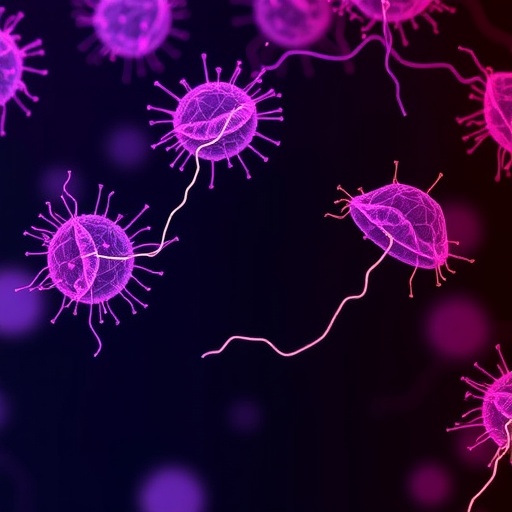In a significant advancement for our understanding of microbial pathogenicity, recent research led by a team comprising Krysińska, Gradowski, Baranowski, and others sheds light on the diverse families of ADP-ribosyltransferases present in the pathogenic genus Legionella. This groundbreaking study, published in BMC Genomics, tackles an important niche in microbial genetics and biochemistry, positioning itself to reshape our understanding of bacterial virulence mechanisms.
The genus Legionella is notorious for its role in causing Legionnaires’ disease, a severe form of pneumonia. The pathogenic characteristics of Legionella species, particularly Legionella pneumophila, are closely tied to their ability to manipulate host cellular processes. This manipulation is significantly orchestrated through ADP-ribosylation, a post-translational modification facilitated by ADP-ribosyltransferases. These enzymes are known to modify host proteins, which can lead to altered cellular signaling pathways and ultimately promote bacterial survival and pathogenicity.
ADP-ribosylation represents a crucial mechanism by which pathogens can hijack host cellular functions. The study focuses on the identification and classification of various ADP-ribosyltransferase families within Legionella species. By employing a comparative genomics approach, the researchers were able to elucidate the evolutionary relationships among these families, revealing that they share common ancestral origins yet diverged into distinct lineages over time. This work highlights the rich evolutionary tapestry of these enzymes and their roles in the adaptation of Legionella to different host environments.
One of the most compelling findings of the study is the identification of multiple ADP-ribosyltransferase genes in various Legionella species, suggesting a broad spectrum of potential pathogenic strategies. The researchers employed bioinformatics tools to analyze genomic data, enabling them to predict the functional capabilities of these enzymes. For instance, some of these genes were found to be highly conserved, indicating their essential roles in bacterial fitness and virulence. Conversely, others appeared to be more variable, potentially allowing for niche-specific adaptations.
The researchers conducted experimental validation of select ADP-ribosyltransferases to understand their functional implications more deeply. By creating knockout strains of Legionella, they assessed the impact of these enzymes on pathogenicity in host models, particularly in macrophages, which are critical target cells for Legionella. The results were revealing; specific ADP-ribosyltransferases significantly enhanced the bacterium’s ability to evade host immune responses, underscoring their importance as virulence factors.
Another notable aspect of the research is the exploration of the interplay between ADP-ribosyltransferases and host cellular signaling pathways. The study presents evidence that these enzymes can disrupt fundamental processes such as immune signaling and apoptosis. By modifying key host proteins involved in these pathways, Legionella can effectively dampen host responses, allowing for successful infection and replication within host tissues.
Furthermore, the implications of this research extend beyond basic science. Understanding the mechanisms by which Legionella manipulates host cells through ADP-ribosylation could pave the way for novel therapeutic approaches. Targeting these enzymes or their pathways may provide new strategies to combat infections caused by this and other pathogenic organisms that utilize similar techniques for immune evasion.
The study also raises important questions regarding the potential for therapeutic interventions. Could small molecule inhibitors that target Legionella ADP-ribosyltransferases serve as a basis for new antibiotics? Given the alarming rise in antibiotic resistance, innovative approaches are urgently needed to manage infections effectively. The findings of this research could stimulate interest in developing such inhibitors, contributing significantly to the field of infectious disease management.
This research also highlights the importance of collaborative approaches in microbial genomics. The multidisciplinary efforts involving molecular biology, bioinformatics, and experimental validation exemplify how much can be achieved when researchers pool their expertise. The collaborative nature of this study serves as a model for future investigations into the complex interactions between pathogens and their hosts.
In conclusion, the survey of ADP-ribosyltransferase families in pathogenic Legionella presented by Krysińska et al. is a vital contribution to our understanding of microbial pathogenesis. As researchers continue to unravel the sophisticated strategies employed by pathogens, this work stands out as a significant step toward developing new therapeutic strategies and enhancing our overall understanding of host-pathogen interactions.
The exploration of ADP-ribosyltransferases in Legionella not only sheds light on the intricate mechanisms of bacterial virulence but also opens avenues for future research aimed at mitigating infections. As the scientific community delves deeper into this field, the potential for transformative discoveries remains substantial, promising to alter the landscape of infectious disease treatment.
Subject of Research: The families of ADP-ribosyltransferases in pathogenic Legionella.
Article Title: A survey of ADP-ribosyltransferase families in the pathogenic Legionella.
Article References: Krysińska, M., Gradowski, M., Baranowski, B. et al. A survey of ADP-ribosyltransferase families in the pathogenic Legionella. BMC Genomics 26, 915 (2025). https://doi.org/10.1186/s12864-025-11994-z
Image Credits: AI Generated
DOI:
Keywords: Legionella, ADP-ribosyltransferases, bacterial pathogenesis, host-pathogen interactions, therapeutic strategies.
Tags: ADP-ribosyltransferases in Legionellabacterial virulence factorscellular signaling pathways in infectionscomparative genomics of Legionellaenzymes modifying host proteins.evolutionary relationships of ADP-ribosyltransferaseshost cellular manipulation by bacteriaLegionnaires’ disease mechanismsmicrobial genetics and biochemistrymicrobial pathogenicity researchpathogenicity of Legionella pneumophilapost-translational modifications in pathogens





